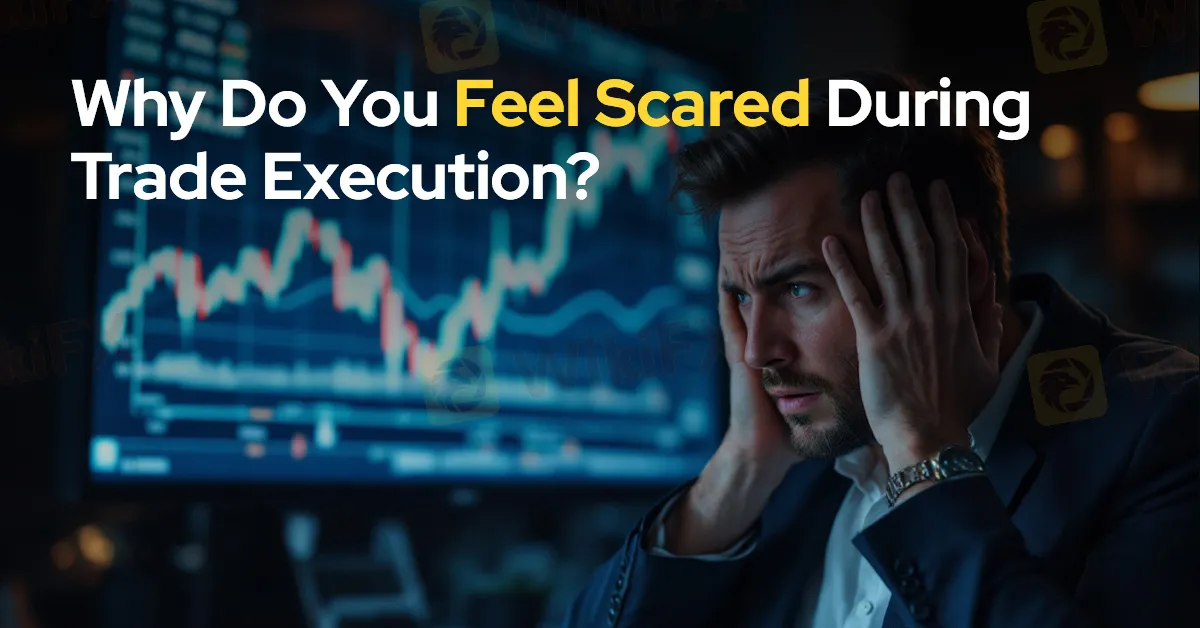简体中文
繁體中文
English
Pусский
日本語
ภาษาไทย
Tiếng Việt
Bahasa Indonesia
Español
हिन्दी
Filippiiniläinen
Français
Deutsch
Português
Türkçe
한국어
العربية
Why Do You Feel Scared During Trade Execution?
Abstract:Trade execution is a pivotal moment for traders. It is when analysis turns into action, and potential profits or losses become reality. However, for many traders, this moment is accompanied by fear. Why does this happen, and how can you address it?

Trade execution is a pivotal moment for traders. It is when analysis turns into action, and potential profits or losses become reality. However, for many traders, this moment is accompanied by fear. Why does this happen, and how can you address it? Understanding the psychological, emotional, and risk management aspects of trading is essential to mastering this fear and making more confident decisions in the financial markets.

At its core, fear during trade execution stems from uncertainty. The market is unpredictable, and no analysis can guarantee outcomes. This uncertainty triggers a natural response rooted in our survival instincts: the fear of loss. For traders, this can manifest as hesitation, second-guessing, or even paralysis when its time to click that “Buy” or “Sell” button.
Additionally, past experiences play a role. Traders who have faced significant losses may develop a psychological barrier to executing trades, fearing a repeat of their mistakes. This is compounded by the pressure of potential financial loss, which can feel overwhelming, especially for those new to trading or operating with large positions relative to their account size.
Trading is an emotional endeavour. The fear of being wrong can evoke anxiety, while the hope of being right can create excitement. Unfortunately, these emotions can cloud judgement, leading traders to deviate from their strategies. Fear during execution is often linked to the potential regret of making a losing trade, which can weigh heavily on a traders mind.
For some, this fear can escalate into a cycle of avoidance. Traders may skip opportunities altogether, unable to face the emotional turmoil of executing trades. Conversely, others may overtrade, attempting to “win back” what they fear losing—a dangerous practice that often leads to greater losses.
One of the most effective ways to combat fear during trade execution is robust risk management. Fear often arises from the perceived consequences of a trade going wrong. By implementing strict risk management practices, such as setting stop-loss orders, using appropriate position sizing, and maintaining a healthy risk-to-reward ratio, traders can limit potential losses and reduce the emotional weight of each trade.
A clearly defined trading plan also helps mitigate fear. When you know exactly why you‘re entering a trade, where you’ll exit, and how much you‘re willing to risk, there’s less room for uncertainty. This structure provides a sense of control, which can alleviate the anxiety of execution.
Fear during trade execution is not inherently bad as it is a sign that you care about your financial decisions. However, it is crucial to manage this fear so it doesnt hinder your progress. Focus on continuous learning, practise discipline, and remember that no trader wins all the time.
Trading is as much a psychological battle as it is a technical one. By understanding the roots of your fear and taking steps to address it, you can transform this emotion from a hindrance into a tool for cautious and thoughtful decision-making. Above all, do not rush your trading journey. Mastery takes time, and patience is the foundation of long-term success.

Disclaimer:
The views in this article only represent the author's personal views, and do not constitute investment advice on this platform. This platform does not guarantee the accuracy, completeness and timeliness of the information in the article, and will not be liable for any loss caused by the use of or reliance on the information in the article.
Read more

The Hidden Checklist: Five Unconventional Steps to Vet Your Broker
Forex broker scams continue to evolve, employing new tactics to appear credible and mislead unsuspecting traders. Identifying these fraudulent schemes requires vigilance and strategies beyond the usual advice. Here are five effective methods to help traders assess the legitimacy of a forex broker and avoid potential pitfalls.

WikiFX Review: Is FxPro Reliable?
Founded in 2006, FxPro is a reputable UK-based broker, trading on various market instruments. In this article, we will help you find the answer to one question: Is FxPro reliable?

Geopolitical Events: What They Are & Their Impact?
You've heard many times that geopolitical events have a significant impact on the Forex market. But do you know what geopolitical events are and how they affect the FX market? Let us learn about it today.

WikiEXPO Global Expert Interview: Simone Martin—— Exploring Financial Regulation Change
In the midst of financial innovation and regulation, WikiGlobal, the organizer of WikiEXPO, stays abreast of industry trends and conducts a series of insightful and distinctive interviews on pivotal topics. We are delighted to have the privilege of inviting Simone Martin for an in-depth conversation this time.
WikiFX Broker
Latest News
Why is there so much exposure against PrimeX Capital?
Russia to Fully Ban Crypto Mining in 10 Regions Starting January 1, 2025
Two Californians Indicted for $22 Million Crypto and NFT Fraud
WikiFX Review: Is Ultima Markets Legit?
Colorado Duo Accused of $8M Investment Fraud Scheme
What Impact Does Japan’s Positive Output Gap Have on the Yen?
Malaysia Pioneers Zakat Payments with Cryptocurrencies
FCA's Warning to Brokers: Don't Ignore!
Financial Educator “Spark Liang” Involved in an Investment Scam?!
21 Arrested in Telangana Cryptocurrency Scam
Currency Calculator


